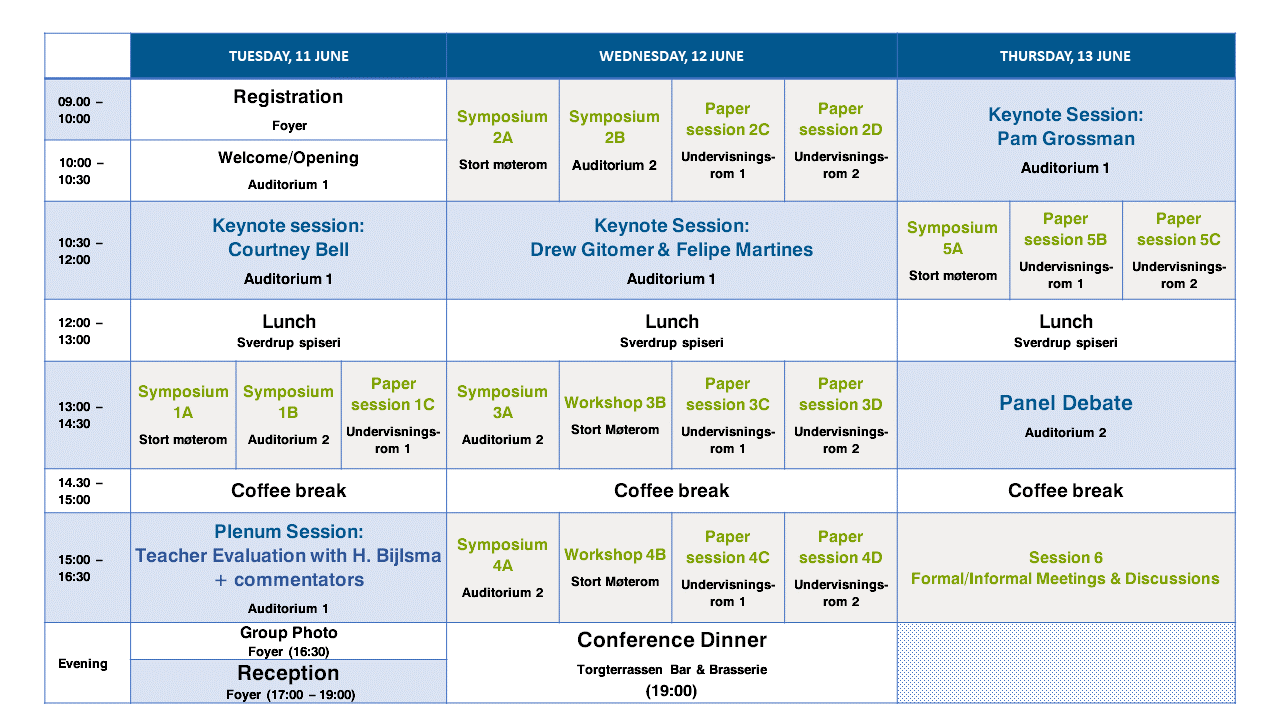Day 1 (Tuesday, 11 June)
|
Symposium 1A |
Subject Specificity Matters: Investigating teaching quality across subjects and countries (Organizer: Kirsti Klette) |
|
Symposium 1B |
Teaching and learning in Nordic schools from a multilingual perspective (Organizer: Hermina Gunnþórsdóttir) |
|
Paper Session 1C |
Policies for Teacher Education • The role of organization- and leadership structure for the work of teacher education program leaders
Inga Staal Jenset • Shaping Policy: Analyzing Stakeholder Perceptions of National Teacher Education Reforms in Norway
Geoffrey Evan Carlisle • From Awareness to Action: Diversity Conceptions and Differentiated Instruction of Teachers in Chinese Teacher Education Programs
Xiangyuan Feng • Quality features in Teacher Education Programs
Doris Jorde |
Day 2 (Wednesday, 12 June)
|
Symposium 2A |
Using classroom videos to improve teaching quality and professional learning in teacher education. (Organizer: Nadine Malich-Bohlig)
|
|
Symposium 2B |
Teaching quality and the school experiences of multilingual learners: A critical perspective (Organizer: Mariana Castro)
|
|
Symposium 3A |
A mixed methods way of thinking in classroom research (Organizers: Lisbeth Brevik & Nora E. H. Mathé)
|
|
Symposium 4A |
Breaking out of silos: Using classroom videos for cross-disciplinary and cross-methodological examinations of teaching (Organizer Mark White) (6 papers).
|
|
Workshop 3B |
Establishing and trying out a video library for teachers’ professional learning: Opportunities, obstacles, and suggestions for solutions (Organizer: Inga Staal Jenset)
|
|
Workshop 4B |
Teacher- Researcher Collaboration QUALE Literature Instruction Organizer: Vibeke Christensen |
|
Paper Session 2C |
Digital technology in the classroom • Effective assessment practices in emergency remote teaching”
Toni Mäkipää • Spatializing literacy and new techno-scholastic environments in Nordic lower secondary classrooms.
Tina Høegh et.al. • Exploring the affective potential of access to writing technology in lower-secondary classrooms
Jenny Högström
|
|
Paper Session 2D |
Analyzing teaching quality: divergent approaches • Measuring the relationship between student perceptions of teaching quality and learning achievement: a framework and a meta-analysis
Sebastian Röhl • How does presentation order affect the reliability of classroom observations of teaching quality in Norwegian mathematics and science lessons?
Armin Jentsch • Investigating the Quality of Teaching from within
Georg Breidenstein & Tanya Tyagunova
|
|
Paper session 3C |
Linking school-knowledge and everyday knowledge across subjects • Connecting to the world beyond the classroom in lower-secondary mathematics and social science lessons in Norway and Sweden
P. N. Aashamar, A J. V. Selling • Representations of economic content in social science education: connecting disciplinary and everyday knowledge for students´ knowledge-building
Michael Walkert & Martin Jakobsson • Differences and similarities in how Nordic literature instruction promote students’ development into good and competent citizens
Anna Nissen et.al. • News coverage in social science teaching – a Bakhtinian analysis
Torben S. Christensen
|
|
Paper session 3D |
Classroom talk across subjects
• Video-Based Rehearsing of Vocabulary Acquisition-Friendly Whole-Class Talk Instigated by Talk Moves (Foreign language learning)
Michel Alexandre Cabot • Improving the quality of classroom discourse: Effects of a collaborative intervention to improve teacher-led text-based discussions in lower secondary
Michael Tengberg et.al. • Managing guided openness in inquiry-based literature education
Vibeke Christensen et.al. |
|
|
|
|
Paper session 4C |
The role of enactment in teacher education • Learning to notice for equity – a scoping review of the literature on equity-oriented teacher noticing
Tracey Lavalette et.al. • ‘Natura, ars, exercitatio’ in a new frame: Rehearsing Teaching Professionally
Sissel Margrethe Høisæter • Creating a space for boundary crossing conversations between school-based and university-based science teacher educators
Silje Leifsen • The purposes and challenges when using modelling as a trigger of rehearsing in teacher education
Vigdis Vangsnes |
|
Paper session 4D |
Supporting learning in the subjects • Scaffolding inquiry in social science education
Nora E. H. Mathé & Anders S. Christensen • Literacy learning in Icelandic lower secondary schools: Use of texts in language arts and social science lessons
Rannveig Oddsdóttir, Rúnar Sigþórsson, Anna Kristín Sigurðardóttir • University preparation of mother tongue teachers - reflection, strengths and weaknesses, challenges
Kateřina Šormová |
Day 3 (Thursday, 13 June)
|
Symposium 5A |
The Possibilities of Layering Frameworks: Examining the Promise of Using Multiple Frameworks in Research on Teaching (Organizer: Sarah S. Kavanagh) |
|
Paper session 5B |
The role of tasks • Reflections on the role of task potential in relation to teacher competence and teaching quality
Kristin Glegoła • Teaching-quality ratings of mathematics classrooms: Do subject-specific observation items matter?
Linn Hansen • Automated Assessment of Multi-Modal-Data to Predict Teaching Quality
Tim Fütterer |
|
Paper session 5C |
Life Skills • Life skills in science education – what do science teachers say and do in the classroom?
Mai Lill Suhr, Rebecca L. S. Barreng • Students’ well-being in the Nordic Schools
Hermína Gunnþórsdóttir et. al. • Childrens’ competences for tomorrow – the work of the “Future Education Initiative
Ann-Kathrin Jaekel |
